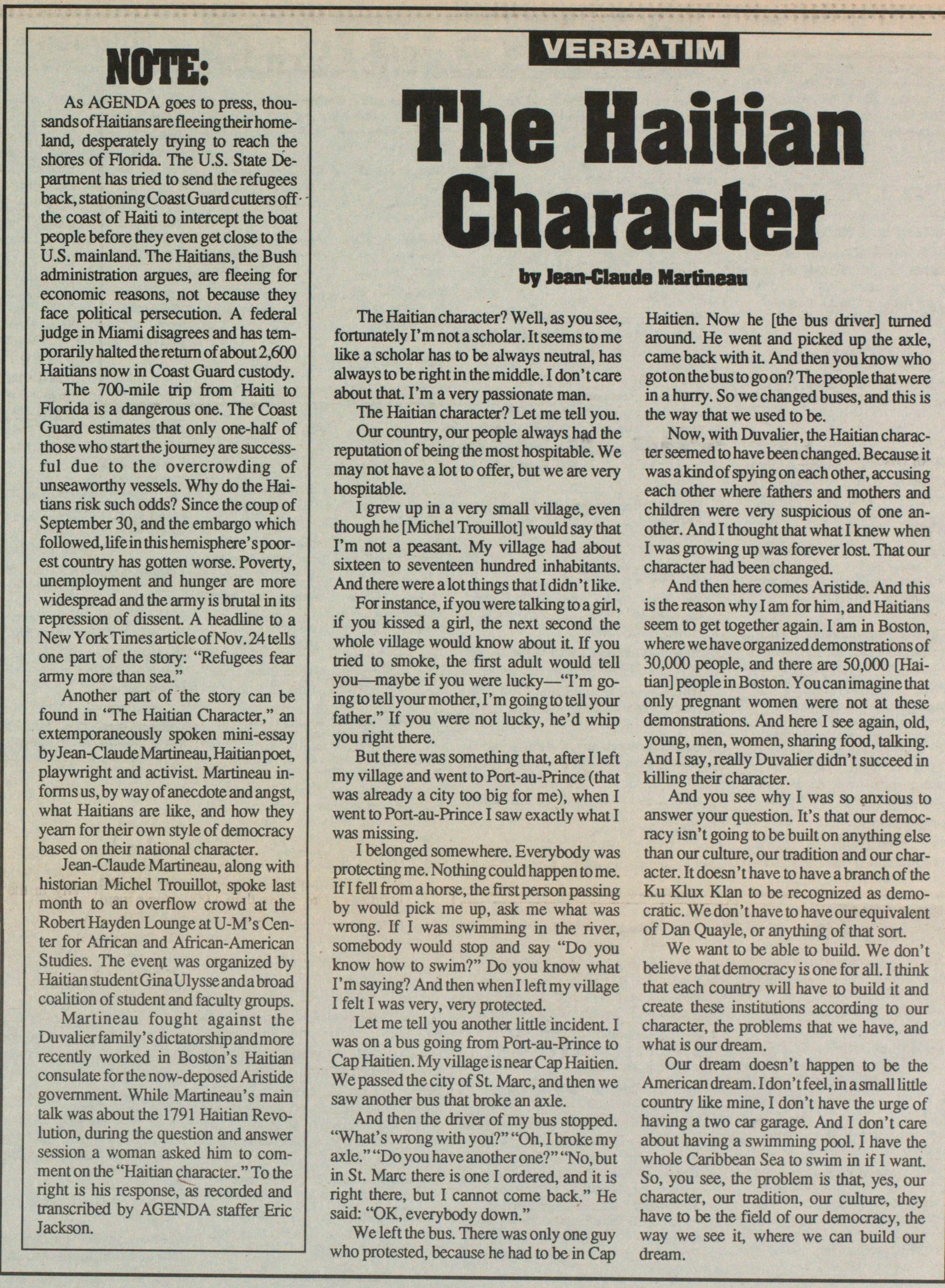The Haitian Character

The Haitian character? Well, as you see, fortunately I'm not a scholar. It seems to me like a scholar has to be always neutral, has always to be right in the middle. I don't care about that. I'm a very passionate man.
The Haitian character? Let me tell you.
Our country, our people always had the reputation of being the most hospitable. We may not have a lot to offer, but we are very hospitable. I grew up in a very small village, even though he [Michel Trouillot] would say that I'm not a peasant. My village had about sixteen to seventeen hundred inhabitants. And there were a lot things that I didn't like.
For instance, if you were talking to a girl, if you kissed a girl, the next second the whole village would know about it. If you tried to smoke, the first adult would tell you - maybe if you were lucky - "I'm going to tell your mother, I'm going to tell your father." If you were not lucky, he'd whip you right there.
But there was something that, after I left my village and went to Port-au-Prince (that was already a city too big for me), when I went to Port-au-Prince I saw exactly what I was missing.
I belonged somewhere. Everybody was protecting me. Nothing could happen to me. If I fell from a horse, the first person passing by would pick me up, ask me what was wrong. If I was swimming in the river, somebody would stop and say "Do you know how to swim?" Do you know what I'm saying? And then when I left my village I felt I was very, very protected.
Let me tell you another little incident I was on a bus going from Port-au-Prince to Cap Haitien. My village is near Cap Haitien. We passed the city of St. Marc, and then we saw another bus that broke an axle.
And then the driver of my bus stopped. "What's wrong with you?" "Oh, I broke my axle." "Do you have another one?" "No, but in St. Mare there is one I ordered, and it is right there, but I cannot come back." He said: "OK, everybody down."
We left the bus. There was only one guy who protested, because he had to be in Cap Haitien. Now he [the bus driver] turned around. He went and picked up the axle, came back with it. And then you know who gotonthebustogoon?The people that were in a huny. So we changed buses, and this is the way that we used to be.
Now, with Duvalier, the Haitian character seemed to have been changed. Because it was a kind of spying on each other, accusing each other where fathers and mothers and children were very suspicious of one another. And I thought that what I knew when I was growing up was forever lost. That our character had been changed.
And then here comes Aristide. And this is the reason why I am for him, and Haitians seem to get together again. I am in Boston, where we have organized demonstrations of 30,000 people, and there are 50,000 [Haitian] people in Boston. You can imagine that only pregnant women were not at these demonstrations. And here I see again, old, young, men, women, sharing food, talking. And I say, really Duvalier didn't succeed in killing their character.
And you see why I was so anxious to answer your question. It's that our democracy isn't going to be built on anything else than our culture, our tradition and our character. It doesn't have to have a branch of the Ku Klux Klan to be recognized as democratie. We don't have to have our equivalent of Dan Quayle, or anything of that sort.
We want to be able to build. We don't believe that democracy is one for all. I think that each country will have to build it and create these institutions according to our character, the problems that we have, and what is our dream.
Our dream doesn't happen to be the American dream. I don't feel, in a small little country like mine, I don't have the urge of having a two car garage. And I don't care about having a swimming pool. I have the whole Caribbean Sea to swim in if I want. So, you see, the problem is that, yes, our character, our tradition, our culture, they have to be the field of our democracy, the way we see it, where we can build our dream.